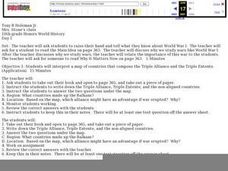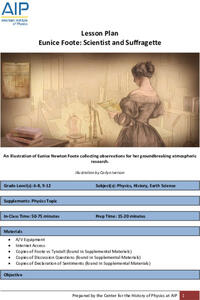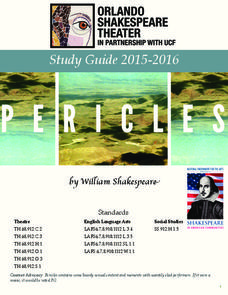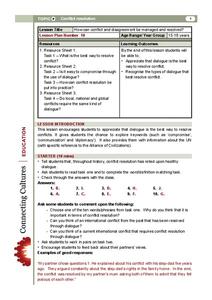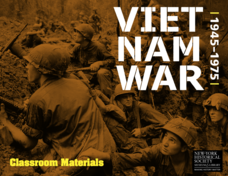Pacific University Oregon
Civil Rights: US History
To gain an understanding of the Civil Rights Movement of the 1960s, class members investigate the Jim Crow Laws, the Emancipation Proclamation, the 13th, 14th, and 15th Amendments of the US Constitution, and the 1898 Supreme Court case,...
ProCon
Standardized Tests
Does the use of standardized testing improve American education? Scholars dive into the issue as they prepare to discuss the debate topic with their classmates. After reviewing the pros and cons, they watch videos to help them arrive at...
Curated OER
Photography and the National Park Service
During the 1800s the United States was expanding westward; land was there for the taking. Kids explore how some early photographers used their photography to influenced the US Congress to save areas like Mirror Lake. They complete a...
Newseum
From the Front Page to the History Books
Young journalists compare news coverage of four major events with how the same events are covered in historical accounts. The ensuing discussion asks class members to compare and contrast the role of a reporter and the role of a historian.
University of Arkansas
Individuals Making a Difference
The focus of this, the third in a five-activity unit study of human rights, is on individuals who made a difference. Billy Bowlegs, Dr. Sun Yat Sen, Fannie Lou Hamer, Michi Weglyn, and Yuri Koshiyama are some of the people class members...
Facing History and Ourselves
How Journalists Minimize Bias
Class members are challenged to write a neutral news story about the events they observe in a short video. After sharing their stories in groups and discussing the different perceptions, the class concludes with a video of journalists...
Annenberg Foundation
Exploring Borderlands
What motivated Europeans to explore the New World, and what effects did their exploration have on Native American populations? The second installment of a 16-part American Passages series prompts pupils to watch a video and read several...
Smithsonian Institution
Women's Role in the War Effort
Did you know that many women were Confederate spies during the Civil War? The resource focuses particularly on the important role women played for both the Union and Confederacy. It uses exercises such as a discussion, video, analyzing...
Echoes & Reflections
Jewish Resistance
Resistance to the Holocaust took on many forms. Learners explore the passive and active resistance of Jewish people who continued their practices and observances, as well as organized resistance against the evils of the Nazis. An...
Curated OER
WWI for World History Honors
Using a textbook, learners will examine various aspects related to the Triple Alliance of WWI. They complete a series of handouts, engage in a class discussion, and interpret a map showing both the Triple Alliance and the Triple Entente....
Curated OER
Family Day
Here's a great way to encourage your kids to celebrate their families. A Family Day event is planned. After a big class discussion on families, preparations are made for the big event. Invitations are created, decorations are made, and...
Curated OER
Lesson Plan on Family History and Past Generations
Second graders listen to The Keeping Quilt and through class/small group discussion relate this story to beliefs, customs, and traditions of their own families. They make a class quilt based on these discussions.
Administrative Office of the US Courts
US v. Alvarez
Is it illegal to lie about military service? Discuss the ways the First Amendment affects the Stolen Valor Act with a lesson that focuses on the Supreme Court case U.S. v. Alvarez. As high schoolers learn more about the history of the...
Center for Civic Education
Orb and Effy Learn About Authority
Simplify the teaching of the US Constitution with this primary grade social studies lesson. While reading a fun story about an imaginary place called Bubble Land, children learn about the concept of authority and the importance of rules...
National Museum of the American Indian
The Kwakwaka'Wakw: A Study of a North Pacific Coast People and the Potlatch
Discover the cultural practices and unique value systems of a group of native peoples from Canada called the Kwakwaka'wakw. Your young historians will discuss how conceptions of wealth can vary and how these native people utilized...
American Institute of Physics
Eunice Foote: Scientist and Suffragette
The greenhouse effect and climate change are hot topics in today's news. Young scientists may be surprised to learn that the concept is not a new one. In fact, Eunice Newton Foote, scientist, inventor, and suffragette, discovered the...
Orlando Shakes
Pericles: Study Guide
Everyone loves a great riddle, right? Everyone except for the characters in Shakespeare's Pericles, who will be killed unless they answer the king's riddle correctly. With the study guide, scholars use words coined by Shakespeare to play...
National Woman's History Museum
Susan B. Anthony: She's Worth a Mint!
A instructional activity all about Susan B. Anthony showcases the Civil Rights leader's contributions towards equality. A Susan B. Anthony coin sparks engagement. Scholars take part in a discussion that sheds light on what being an agent...
American Battlefield Trust
The Common Civil War Soldier
If it were possible to step back in time, what would learners want to know about the Civil War? With the aid of discussion prompts, they now have that chance. Invite a Civil War re-enactor to your classroom and have all their questions...
University of North Carolina
Remembering Martin Luther King, Jr.
After reading the article "Kings Dream Everyday," class members conduct a Socratic seminar discussion of Martin Luther King's contributions to the civil rights movement. They then read and respond to a passage from Michael Eric Dyson's...
Smithsonian Institution
World War II
December 7th is remembered as a tragic time in American history, but some scholars may not know why. The resource explains the significance of the bombing of Pearl Harbor as well as how World War II relates to American history. The...
PBS
Analyzing McCulloch v. Maryland
What happened in the Supreme Court case of McCulloch v. Maryland? The resource teaches the specifics of the case with a video and provided discussion questions covering issues such as precedent and the Supreme Court as an equal branch of...
University of the Desert
How Can Conflict and Disagreement be Managed and Resolved?
As you explore the meaning of cultural understanding and diffusion with your learners, discuss how dialogue can play a role in resolving conflicts based on misunderstanding. Examine keywords such as compromise, communication, and...
New York Historical Society
The Vietnam War: 1945-1975
Do pupils know that the Vietnam War spanned a period of 30 years? A war that long is bound to leave devastating effects. Help young historians develop a comprehensive understanding of the war through multiple units on the subject that...











